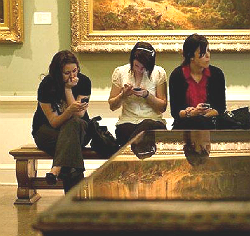Perpetual Adolescence
In late July 2012, I was chatting at a cocktail party with a NASDAQ executive, teasing her about the “botched” Facebook IPO, which had occurred two months theretofore. I opined that Facebook’s business is fluff, based on dysfunctional behavior — a heretical comment in Silicon Valley. If it were a real business, I continued, its stock would have at least recovered to the $38 IPO price (it was $28 that day and is $26 ten months later).
Then, this woman made my point about dysfunction with a personal anecdote, telling me that her teenage daughter recently had wanted to invite some friends over for dinner. Mom counseled her daughter to call each of them. Call them? No way! Who calls people? Instead, the daughter “invited” her friends via an impersonal announcement on her Facebook page. “And, what if your friends don’t see the invitation?” Mom asked. “That’s their problem,” the daughter replied.
The infantile exchange above is no surprise; it typifies today’s entitled youth and coddling parents. In 2007, Diana West penned The Death of the Grown-Up: How America’s Arrested Development Is Bringing Down Western Civilization. She posited that Americans are in a state of perpetual adolescence, rooted in the ’50s and ’60s, and that the transition to adulthood does not end until the age of 34.
In a discussion of her book at the Heritage Foundation, West gives some eye-popping stats that explain America’s mobile-social obsession:
- More adults (18-49) watch the Cartoon Network than CNN:
- Readers as old as 25 are buying young-adult fiction, which is expressly written for teenagers
- The average video gamester was 18 in 1990; now, he’s going on 30
- The National Academy of Sciences has redefined adolescence as the period extending from the onset of puberty (12) to age 30.
Dr. Keith Ablow, a prominent psychiatrist, explains the mobile-social obsession, as well as its consequences, by claiming that we’re raising a generation of deluded narcissists. Consider this assessment when you see teens hermetically attached to their phones.

Antisocial Is the New Social
Increasingly, according to the Wall Street Journal, people query their favorite social sites exclusively via mobile devices — so frequently that they’re losing their communication skills, brain cells, and social etiquette. I call them Mobile Mobsters.
Antisocial is the new social. According to new research by Carnegie Mellon University’s Human-Computer Interaction Lab, our culture’s pervasive mobile-social obsession is making people dumber. The following two videos exemplify this trend.
Watch Dan Bank of Fox News interview people in Manhattan about current events. Most of them don’t know anything about anything. Really! Bill O’Reilly nails the Mobile Mobsters in his summary.
Furthermore, coddled millennial college graduates are so attached to their mobile devices and detached from decorum that they’re unequipped for the workplace. According to HR execs, the Mobile Mobsters answer texts during job interviews. Worse, they bring their pets and parents to the interviews! How infantile.
Critical Thinking
Something is wrong here. Yet, most corporate execs are embracing social media with blind, illogical zeal. IBM’s CEO Virginia Rometty told the Council of Foreign Relations that “social software will become the ‘new production line’ to create value.” Is this not a case of myopic mobile marketing?
Why? Because betting shareholders’ cash on dysfunctional behavior makes no sense. How detached can people become from each other, and from reality, before they’re unable to function? Anyone who brings Daddy or Snagglepuss to a job interview is already at the red line.
I have a few questions for Ms. Rometty of IBM and her colleagues at other companies: What kind of customers are at the other ends of these mobile devices; what will you sell them? Is the mobile-social trend you’re riding sustainable; if so, based on what logic?
Mark Zuckerberg made a big splash, in early April, with his introduction of Facebook Home, a vehicle for even-more social interaction and advertising on Android-based smartphones. It’s been a dud: the Facebook Home-sporting “HTC First” phone price has been cut from $99.99, with a two year contract, to just 99 cents — with the same AT&T two-year agreement.
What’s up with that? Jon Xavier, of Silicon Valley Business Journal, believes Facebook Home has crossed the user-privacy threshold; Facebook users have rejected it. A welcome sign of maturation, perhaps.
Let’s apply critical thinking here. There’s no possible way to perform useful work on a mobile device; one needs a desktop or laptop computer for that. So, those in the Mobile Mob can’t, realistically, earn high incomes.
Note: one in five Americans is on food stamps, California no longer requires eighth-graders to take algebra, and almost half of working college grads are in jobs not requiring college degrees.
Today, Yahoo officially announced its intention to acquire Tumblr, the New York-based social-blogging service, for $1.1B. Why? To gain the under-30 crowd: the perpetual adolescents, the deluded narcissists — the apparent Holy Grail of corporate America.
Rx from the WhiteNoise Doctor™
Shopping, texting, monitoring friends’ whereabouts, and posting photos and the minutia of daily life are not wealth-building activities. Are Mobile Mobsters a sustainably profitable market merely because they “gather” en masse in a few places? C’mon.
If you are uncertain about the characteristics of Mobile Mobsters, watch the videos above, once again, for some clues.
Now, what products and services can they afford, on a sustainable basis; is it profitable to serve them? I’m still having trouble wrapping my mind around Virginia Rometty’s social software as a new production line to create value. It’s impossible to yield sustainable value from customers who have little of it to impart. Evidence abounds that, the more time people spend in the mobile-social world, the more dysfunctional they become. You do the math.
Myopic mobile marketing is the illogical zeal with which CEOs use mobile technology to reach the under-30 crowd — rejecting reality about their immaturity. Including mobile-social in the overall marketing mix can, in profitable situations, make sense; a bet-your-company focus, though, makes no sense.
The question is, whose mobile-social obsession is greater: that of CEOs or that of deluded narcissists? It’s tough to tell. Either way, obsession always clouds judgment.
Finally, if perpetual adolescents begin magically to grow up, Yahoo’s ridiculous overpayment for an unprofitable Tumblr will look even more myopic.
POSTSCRIPT #1: “Just Look Me in the Eye Already”
POSTSCRIPT #2: Mobile Mobsters Increasingly Suffer From Digital Dementia
POSTSCRIPT #3: Mobile Mobsters Don’t Know Much About Independence Day
POSTSCRIPT #4: 21 Million Mobile Mobsters Still Living With Mommy & Daddy
POSTSCRIPT #5: Mobile Mobsters (Facebookers) Feel Unsocial and Unhappy
POSTSCRIPT #6: UK Shrinks: Adolescence Ends at 25, Not 18
© 2013 Marc H. Rudov. All Rights Reserved.
About the Author

Marc Rudov is a branding advisor to CEOs,
producer of MarcRudovTV, and author of four books

